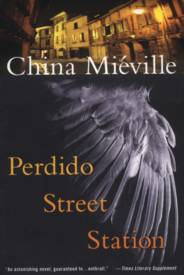

| Click on a book's image or title to order from Amazon.com |

Perdido Street Station
Del Rey, TPB, © 2000, 710 pp, ISBN #0-345-44302-0Reviewed May 2004
Perdido Street Station is a dark and moody fantasy novel, occurring in the fictional city of New Crobuzon in the world of Bas-Lag. While clearly influenced by Mervyn Peake's Gormenghast novels, it also has a feel similar to Tim Powers, and also to Alastair Reynolds' Chasm City in its rich panoply of ideas and its dark and rough setting. (It's also been compared to the works of Neal Stephenson, although I don't really see it.)
New Crobuzon is a hodge-podge of subcultures, mostly human but also with water-manipulating Vodyanoi, huge cactus-people, and various other inhabitants. It is ruled by a corrupt Parliament and Mayor, and has a thriving underworld. In this city lives Isaac Dan der Grimnebulin, an independent research scientist who studies a variety of things in a warehouse in a marsh. He is rather scandalously involved with Lin, a Khepri, whose females have humanoid bodies but insect bodies as heads.
The same day, Lin is contracted in her role as a artist to craft a statue of a rather shady and horrifically altered individual named Mr. Motley, while Isaac is contacted by a Garuda, a race of avian humanoids. This Garuda, Yagharek, has lost his wings due to transgressing against the rather libertarian Garudan laws, and wishes Isaac to find some way for him to fly again, under his own power. And he can pay well.
Isaac drops everything to learn everything he can about flight. Perhaps he can turn Yag into one of the Remade, individuals who have been bodily altered by having natural or artificial body parts grafted onto their bodies. Along the way he collects a wide variety of samples of flying creatures, talks to individuals around the city, and ends up with a rather interesting caterpillar which piques his curiosity. He also investigates the potentials of Crisis Theory, where objects change or react when put under pressure of true threat.
The first third of the novel is the growing storm, as there are hints of something horribly wrong in the city which Isaac has inadvertently stumbled into. Then all hell breaks loose, and the city is terrorized by a set of horrific extradimensional creatures who seem impossible to kill.
Faced with the ineffectiveness of the city's ruling class, Isaac and his friends embark on a quest to destroy the creatures, and along the way encounter even more wonderful and terrible facets of New Crobuzon.
No one can reasonably accuse Miéville of being short on ideas, and I imagine him crafting this gothic city and then thinking of what he can drop into it as an antagonist which would truly scare the wits out of its inhabitants. And he succeeds, even if the story does hinge a little too much on the city's overlords and underworld bosses being essentially incompetent when faced with a serious threat.
Perdido Street Station doesn't quite suffer from having too many ideas, although some bits are tossed out which aren't really pertinent to the story. For instance, the Handlingers, a weird species who seem to exist just for the benefit of one thrilling fight scene, but who are otherwise irrelevant. The novel gets around these digressions by having all hell break loose periodically, so even if the overall plot has stalled for a bit, at least it's tense and exciting in the meantime.
What the story is quite short on is theme. The story belongs to Isaac and Yagharek all the way, since they both have the most growing to do and the most changes to undergo. The central theme is one of redemption - righting wrongs, and overcoming past misdeeds. But, inexplicably, the theme is consciously - even roughly - shoved aside in the book's final chapters. While the plot overall tracks effectively and remains true to its characters (though the characters don't have a lot of depth), somehow it goes wrong and ends in a terribly unsatisfying place. Much is suggested in the end, but after 700 pages the reader deserves more than hazy suggestion. It's not that the conclusion is morally ambiguous, it's that the story feels unfinished, and the ambiguity serves no purpose.
Still as a second novel Perdido Street Station is impressive in its scope, if not fully successful in its execution. I'm certainly up for reading more Miéville, in the hopes that his future work will tighten up the story and deliver a more resonant climax. There's huge potential here.
hits since 18 May 2004.